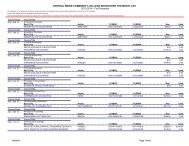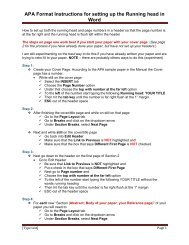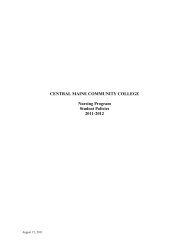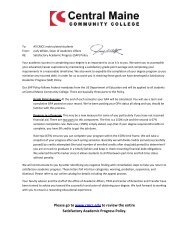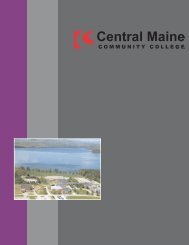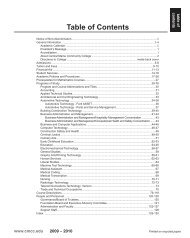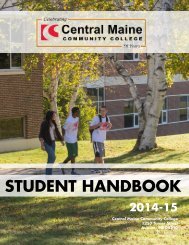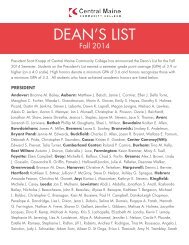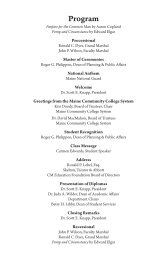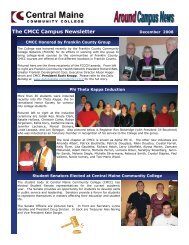Academic Policies and Procedures - Central Maine Community ...
Academic Policies and Procedures - Central Maine Community ...
Academic Policies and Procedures - Central Maine Community ...
Create successful ePaper yourself
Turn your PDF publications into a flip-book with our unique Google optimized e-Paper software.
course<br />
descriptions<br />
Course Descriptions<br />
HIS 296 Special Topics in History<br />
3 credits (3 Lecture 0 Lab 0 Shop)<br />
3 Hr/Wk (3 Hr. Lecture) *15 weeks<br />
The students in this course will analyze selected<br />
topics in history. These topics will analyze various<br />
periods <strong>and</strong> themes in history. The special<br />
topic analyzed is not a regular course offering<br />
of the social sciences department. Since the<br />
topic covered in this class differs from year to<br />
year, students should seek further information<br />
before registering regarding the particular topic<br />
that will be analyzed. Possible topics to be analyzed<br />
include: Modern African-American History,<br />
the Vietnam War, Native American History,<br />
Women in American History <strong>and</strong> The History of<br />
Lewiston-Auburn. Co- or prerequisite: One history<br />
course or instructor permission.<br />
Human Geography (GEY)<br />
GEY 101 Human Geography<br />
3 Credits (3 Lecture 0 Lab 0 Shop)<br />
3 Hrs/Wk (3 Hrs. Lecture) *15 wks<br />
Human Geography constitutes an introduc tory<br />
course designed to furnish the student with a<br />
general underst<strong>and</strong>ing of the spatial dimensions<br />
of human culture. The course provides an overview<br />
of the global distribu tion of such elements<br />
of culture as popula tion, languages, religions,<br />
economic activities, urban systems, <strong>and</strong> political<br />
organization. The spatial perspective will furnish<br />
a greater underst<strong>and</strong>ing of the cul tural world<br />
around us, <strong>and</strong> patterns of human activity which<br />
exist in dynamic inter action with the physical<br />
environment.<br />
Humanities (HUM)<br />
HUM 294 Special Topics in Humanities<br />
3 Credits (3 Lecture 0 Lab 0 Shop)<br />
3 Hrs/Wk (3 Hrs. Lecture) *15 wks<br />
This course will examine particular aspects of<br />
the humanities, depending on the semester. Examples<br />
might be-music, liter ature <strong>and</strong> art of a<br />
specifi c time period; the history of language as<br />
it related to modern modes of communication;<br />
the work of artists, writers <strong>and</strong> thinkers of a particular<br />
period or movement. Topics can cover a<br />
range of disciplines classifi ed under the category<br />
“humanities” - art, music, lan guage, cinema,<br />
philosophy, gender stud ies, <strong>and</strong> so on. Because<br />
this is not a regular offering of the Humanities<br />
Depart ment, students are encouraged to seek<br />
detailed information from the instructor or department<br />
chair, prior to registering. Pre requisite:<br />
Successful completion of ENG 101.<br />
HUM 296 Independent Study in Humanities<br />
3 Credits *15 wks Number of hours per week to<br />
be deter mined by Advisor<br />
This course is designed to allow students<br />
to work on a semester long project in the humanities.<br />
The project will be developed by the<br />
student in conjunction with the instructor of the<br />
course. The student will meet with the instructor<br />
periodically through the semester to ensure the<br />
project objectives are being met. Prerequisites:<br />
The student must have completed (12) credit<br />
hours in a catalog program, be in good academic<br />
st<strong>and</strong>ing, be recommended by his or her<br />
advisor, <strong>and</strong> meet with the course instructor.<br />
Human Services (HUS)<br />
HUS 112 Introduction to <strong>Community</strong> Mental<br />
Health<br />
3 Credits (3 Lecture 0 Lab 0 Shop)<br />
3 Hrs/Wk (3 Hrs. Lecture) *15 wks<br />
This course provides a historical frame work for<br />
underst<strong>and</strong>ing the current role of human services<br />
in meeting a variety of human needs in society.<br />
An emphasis is placed on the work of social service<br />
agen cies <strong>and</strong> the roles of human services<br />
work ers. The nature of helping relationships including<br />
attitudes, skills <strong>and</strong> knowledge required,<br />
value conflicts <strong>and</strong> dilemmas in the field will be<br />
explored. The organization <strong>and</strong> delivery of services<br />
offered to individu als, families <strong>and</strong> the community<br />
will be dis cussed. Care of specific populations<br />
such as children, the aging, <strong>and</strong> those with<br />
sub stance abuse, mental illness, <strong>and</strong> developmental<br />
disabilities in a multicultural society will<br />
be highlighted. This course will also explore the<br />
different methods, careers, <strong>and</strong> job opportunities<br />
in the various helping pro fessions, <strong>and</strong> the goals<br />
of the human serv ice program in particular.<br />
HUS 153 Substance Abuse<br />
3 Credits (3 Lecture 0 Lab 0 Shop)<br />
3 Hrs/Wk (3 Hrs. Lecture) *15 wks<br />
This course investigates drug use, abuse, <strong>and</strong><br />
addiction. Psychological, social, legal, spiritual,<br />
<strong>and</strong> philosophical sources of drug use <strong>and</strong> abuse<br />
are explored. Five areas of emphasis will be<br />
examined including the societal forces that influence<br />
the phenome non; the drugs themselves,<br />
so-called licit <strong>and</strong> illicit drugs or “street drugs” <strong>and</strong><br />
med ications <strong>and</strong> their use <strong>and</strong> effects on mind,<br />
body, <strong>and</strong> emotions, i.e., the pharmacology of<br />
drug use; the drug users themselves, <strong>and</strong> why<br />
they use drugs; the theories of addiction; rehabilitation<br />
<strong>and</strong> relapse pre vention which will address<br />
what works <strong>and</strong> what does not; <strong>and</strong> prevention<br />
including the drug wars, education as prevention,<br />
<strong>and</strong> the failure of drug education. Prerequisite:<br />
Successful completion of HUS 112 or instructor<br />
permission.<br />
HUS 155 Case Management<br />
3 Credits (3 Lecture 0 Lab 0 Shop)<br />
3 Hrs/Wk (3 Hrs. Lecture) *15 wks<br />
This course explores the theory, principles, <strong>and</strong><br />
methods of casework in various social agency<br />
settings with attention focused on identifying<br />
<strong>and</strong> assessing situational prob lems using social<br />
<strong>and</strong> social psychological variables. Skill<br />
development will emphasize basic methods of<br />
case load management, coordinating various<br />
components to com munity social services, <strong>and</strong><br />
insuring conti nuity of services to clients. Topics<br />
covered include: information gathering, recordkeeping,<br />
monitoring treatment plan implementation,<br />
referral to other service providers,<br />
<strong>and</strong> the appropriate utilization of a caseworker’s<br />
time. The case manage ment policies of various<br />
community agen cies will be examined. Prerequisite:<br />
Successful completion of HUS 112 or<br />
instructor permission.<br />
HUS 241 Human Services Practicum I<br />
4 Credits (1 Lecture 0 Lab 3 Clinical)<br />
10 Hrs/Wk (1 Hr. Lecture 9 Hrs. Clinical) *15 wks<br />
The goal of the course is to integrate course<br />
theory learned throughout the cur riculum with<br />
practical, beginning clinical work <strong>and</strong> community<br />
service networking, by providing prospective<br />
human services workers with an opportunity to<br />
learn experi entially at a human services agency<br />
in the community. The focus is for the student to<br />
learn how an agency functions <strong>and</strong> experi ence<br />
being a part of that agency. A weekly one hour<br />
seminar will assist the student to process <strong>and</strong><br />
integrate knowledge gained in the foundation<br />
courses with the experien tial learning gained at<br />
the field site. It will serve as a forum for sharing<br />
field experi ences <strong>and</strong> provides students with a<br />
peer support group. The focus will be on developing<br />
the skills necessary for human services<br />
practice, i.e., observation, human relations,<br />
interviewing, self-awareness, <strong>and</strong> leadership.<br />
Prerequisites: Successful completion of HUS<br />
112, HUS 155, PSY 101, PSY 151 <strong>and</strong> SOC<br />
200. Co-requisites: HUS 153, PSY 111, <strong>and</strong><br />
SOC 201, with a grade of C or better, <strong>and</strong> permission<br />
of the program director.<br />
104 www.cmcc.edu 2010 ~ 2011



